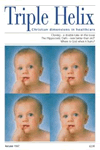Entertaining phrases from research ethics.
Dr Martyn Evans gives a long list of thought-provoking and amusing definitions. Examples: 'Data - little blob-like thingies on a chart. Initial data - blobs through which no curve could remotely be plotted. Revised data - blobs through which a curve is plotted faultlessly. Ethics committee meeting - a four-hour paralysis of all clinical services within a District Health Authority.' (Source: Bulletin of Medical Ethics, February 1997; p21.)
Cars and Centenaries.
Britain's first recorded drunk driving case was on 10th September 1897 when 25-year-old cabdriver George Smith drove into the front of 165 Bond Street, the home of actor Sir Henry Irving. 'The prisoner admitted having had two or three Glasses of beer' and was fined 20 shillings. Thirteen days later, the first child killed on the British highway was 9-year-old Stephen Kempton who fell while riding on the back of a taxi. (Source: Catholic Roadwatch, PO Box 1580, London W7 3ZP.)
European Parliament calls for ban on human cloning.
A resolution on 12th March 1997: ' . . . 2. Calls for an explicit worldwide ban on the cloning of human beings; 3. Urges the Member States to ban the cloning of human beings at all stages of formation and development, regardless of the method used, and to provide for penal sanctions to deal with any violation.' The resolution also calls for strict controls on animal cloning. (Source: Bulletin of Medical Ethics, May 1997; p10-11.)
Chaplains on transplant teams increase organ donation.
Consultant urologist Grant Williams imported from Boston the practice of having the chaplain present when seeing the grieving relatives of brain damaged potential donors. At Charing Cross Hospital, donation of organs was never refused when the chaplain participated in the dis-cussion. He thinks the relatives 'felt that the chaplain was on their side rather than mine'. (Source: British Medical Journal, 21 June 1997; 314: 1831.)
Homoeopathy fails evidence base test.
Lambeth, Southwark and Lewisham Health Authority has stopped paying for homoeopathic treatment because there Is not enough evidence to support its use. It had previously been referring more than 500 patients a year to the Royal Homoeopathic Hospital in London, but public health doctors took the decision after a literature review under their policy of purchasing only evidence based medicine. (Source: British Medical Journal, 17 May 1997; 314: 1574.)
Cannabis on prescription?
Representatives at the British Medical Association's annual meeting called for the legalisation for medicinal use of drugs derived from cannabis. Only two derivatives are currently licensed but enthusiasts claim that other annabinoids may have medical benefits, and those listing side effects lost the day. If legalised, consumption would be oral, by aerosol, or by injection, and not by smoking. (Source:Jeremy Laurance, The Independent, 3July 1997, p8.)
Religion and 'inappropriate' treatment.
Because of religious beliefs, American patients or their families are making more requests for treatment which their physicians consider inappropriate. After examining one Muslim and three Christian cases, an ethics paper offers some helpful guidance and concludes 'that most persistent requests for 'inappropriate' treatment should be honoured'. (Source: Journal of Medical Ethics 1997; 23: 142-147.)
First synthetic human chromosome.
Researchers in Ohio have constructed the first artificial human chromosome. Disguised in a fatty coating, the fake chromosome penetrated the cell walls of human cancer cells, which organised the DNA as if it came from a naturally occurring cell, and the information was inherited by the next generation of the cell culture. Whilst perhaps presaging techniques to introduce 'therapeutic' DNA into the body, there is a Brave New World feel here. (Source: The Splice of Life, June 1997; Vol 3 No 6 p13.)
Calls to ChildLine.
90,000 calls a year to this 10-year-old UK helpline for children means about 250 a day are received. 82% are from girls. Family relationships, bullying, physical abuse, sexual abuse and pregnancy are the most common reasons for calling. The magic number is 0800 1111. (Source: Quadrant, May 1997.)
SHO life more satisfying than PRHO life.
In a survey of junior doctors' job satisfaction and health, 'respondents reported significantly higher scores for satisfaction with the job itself and with the achievement value and growth aspect of job satisfaction in 1994 (as SHOs) than in 1993 as PRHOs'. Perhaps CMF is right to target its pastoral care at the most recently qualified? (Source: Health Trends 1997; 28: 132-134.)
Consumerism can be objectionable.
In a paper on consumerism and the internal market, philosopher Tom Sorell writes 'moral criticism of recent NHS reforms may stop short of calling consumerism into question. This, however, would be a mistake: consumerism can be objection-able both within and beyond the health care market.' (Source: Journal of Medical Ethics 1997; 23: 71-76.)
Atheist's tribute to Christian patient.
The JME isn't all philosophy. Italian neurologist Claudio Crisci describes his relationship with his patient Louise, dying from central neurofibromatosis. 'As I am an atheist and Louise was religious, we avoided the religious issue in our talks: time was too precious to her to spend it in philosophical discussions. I never asked her how she could believe in a God who played with her and her family this way, because I already knew the answer, absurd to me: 'blessed are they who suffer, for they will be comforted' (Matthew 5:4) . . . When I think of Louise, I envy her her 'absurd' faith and moral strength, her hunger of life.' (Source: Journal of Medical Ethics 1997;23: 18.)































